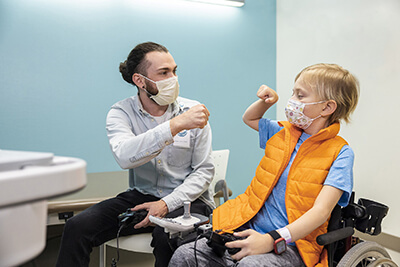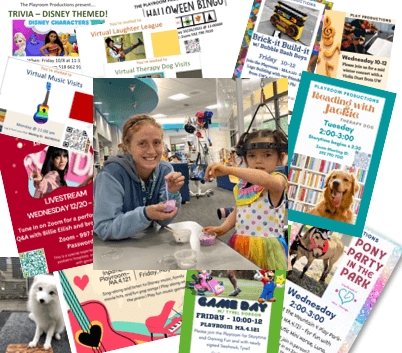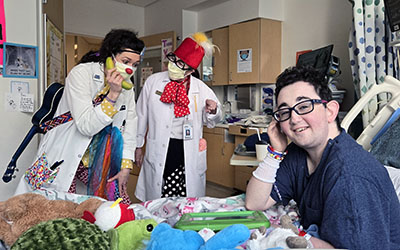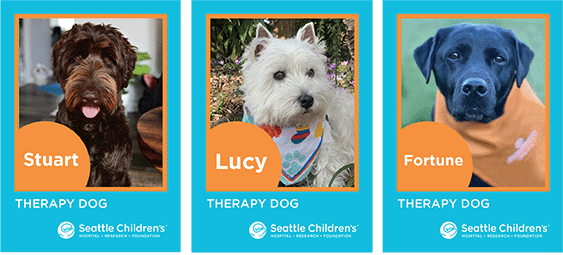Child Life
Our Child Life Department helps make your family’s experience at the hospital a positive one. Child Life specialists are members of your child’s healthcare team. They work directly with you and your child to help you relieve tension, express concerns and fears, and feel more in control about your hospital experience.
Child Life Specialists…
- Explain a diagnosis or treatment in words your child or teen can understand.
- Create a coping plan your child can use during a medical test or procedure.
- Offer support during and after a medical test or procedure.
- Use play to help your child understand medical procedures and express feelings.
- Work with medical staff to assess your child’s unique needs.
- Give you information about child development and the effects of healthcare.
- Teach techniques to help your child cope and relax.
- Offer support to help families cope with death or loss in partnership with the Journey Grief Support Program.
Therapeutic Gaming and Digital Technology Specialists
 Therapeutic Gaming and Digital Technology Specialists foster a deep connection with children and teens who may need more diverse and complex distraction during a hospital admission. They manage, maintain and deploy the gaming technologies directly to patients and provide one-on-one/group gaming experiences. Through interdisciplinary collaboration, patients who will be most benefitted are identified; the Gaming Team then uses those technologies intentionally to teach coping skills, goal-setting, and resiliency.
Therapeutic Gaming and Digital Technology Specialists foster a deep connection with children and teens who may need more diverse and complex distraction during a hospital admission. They manage, maintain and deploy the gaming technologies directly to patients and provide one-on-one/group gaming experiences. Through interdisciplinary collaboration, patients who will be most benefitted are identified; the Gaming Team then uses those technologies intentionally to teach coping skills, goal-setting, and resiliency.
Creative Arts Therapies
Art and music therapy services are provided on all inpatient units at the hospital campus in Seattle. Individual therapy sessions are provided on a referral basis. To request a referral, ask your nurse or medical team to put in an order for music therapy or art therapy. For more information about these services, please contact the Child Life administrative office at 206-987-2179.
Goals of art and music therapy
- Decrease anxiety.
- Promote expression of feelings and emotions related to illnesses.
- Decrease perception of pain.
- Increase opportunities for normalized play.
- Increase functional motor skills.
- Improve verbal and non-verbal communication skills.
- Develop positive coping skills.
- Promote relaxation.
- Provide opportunities for peer interaction.
- Promote a sense of community within the hospital environment.
- Increase opportunities for choice and control.
Patients do not have to be artistic or musical to benefit from art and music therapy!
Art therapy
 Art therapist Rosalie Frankel with patient Jaylin after an art therapy session.
Art therapist Rosalie Frankel with patient Jaylin after an art therapy session. By using art interventions like drawing, painting, clay and collage, patients and families increase self-awareness; cope with symptoms, stress and traumatic experiences; and find joy in the process.
All the art therapists at Seattle Children’s are registered art therapists, which means they have a master’s degree in art therapy, and have completed 600 supervised clinical internship hours after graduation. As part of the coursework, art therapists complete coursework in human development and counseling, and become proficient with a variety of art materials.
Music therapy
 Music therapist Betsy Hartman with patient Allistaire during a music therapy session.
Music therapist Betsy Hartman with patient Allistaire during a music therapy session. Through singing, instrument playing, songwriting, music listening, drumming or other music activities, music therapy helps patients and families feel more comfortable and normalize their hospital experience. Our music therapists are trained to create individualized goals to give patients the opportunity to learn new coping skills, collaborate to assist with rehabilitation, and redirect their attention from pain and anxiety.
All the music therapists at Seattle Children’s are board-certified, which means they have a minimum of a bachelor’s degree in music therapy, completed a 1,200-hour supervised internship and passed the board certification exam. As part of the coursework, all board-certified music therapists must have proficiency in voice, guitar, piano and percussion.
Virtual art and music therapy activities
Our art and music therapists and volunteers have created several videos of activities that can be done in patient rooms, at home, or anywhere else that works for you.
Enrichment Programs
 Bringing engaging and inspiring activities and visitors to our patients, families, and staff is the goal of our Enrichment programs. Whether facilitating visits from our Laughter League medical clowns, Music and Art Cart volunteers or community partners such as the Woodland Park Zoo, our in-person and virtual programs present opportunities for stimulating creativity and promoting healthy play-based learning.
Bringing engaging and inspiring activities and visitors to our patients, families, and staff is the goal of our Enrichment programs. Whether facilitating visits from our Laughter League medical clowns, Music and Art Cart volunteers or community partners such as the Woodland Park Zoo, our in-person and virtual programs present opportunities for stimulating creativity and promoting healthy play-based learning.
Laughter League
 Laughter League is a national nonprofit organization focused on engaging and empowering through laughter. Laughter League's professional performers create moments of levity and healing in healthcare environments all over the country, empowering patients and emboldening hope.
Laughter League is a national nonprofit organization focused on engaging and empowering through laughter. Laughter League's professional performers create moments of levity and healing in healthcare environments all over the country, empowering patients and emboldening hope.
Laughter League has been an integral presence at Seattle Children's Hospital, offering regular visits throughout the hospital each week. In 2023, Laughter League began bringing their joy and humor to patients on the Psychiatry and Behavioral Medicine Unit.
Animal-Assisted Activities

For some children, the stress of a hospital stay can be so overwhelming that medical treatment becomes extremely difficult. A visit from a therapy dog gives many patients the energy and motivation they need to make progress and to experience joy, even in the midst of challenging circumstances.
Seattle Children’s Animal-Assisted Activities Program offers patients, family and staff interaction with volunteer therapy dogs and handlers. Benefits include stress reduction, normalization of the hospital environment and overall feelings of comfort and happiness. We have therapy dogs who make regular visits to the hospital. The child life specialist or nursing staff can assist with scheduling a therapy dog visit.
Other Services We Offer
Inpatient Playroom
Location and hours:
- The inpatient playroom is located on level 4, Mountain zone.
- Monday through Friday: 10 a.m. – 12 p.m., 2 – 4 p.m.
- Closed on Saturday and Sunday
Who is eligible to visit the Playroom?
- Inpatient patients, siblings and caregivers on standard precautions are permitted to enter the inpatient playroom.
- Patients, siblings, staff and any accompanying parent/caregiver(s) must wear a mask at all times.
- Children under age 12 must be accompanied by a caregiver, staff member or unit volunteer.
Who is not eligible to visit the Playroom?
- Patients and families in isolation precautions are not permitted.
- Patients and families who are on standard isolation precautions and not able to safely mask in the playroom may be able to coordinate a time with a Child Life staff member outside of the above hours.
Clinic Playrooms
Hospital Campus
The outpatient clinic playroom is currently closed. We are available to provide support on a case-by-case basis.
Bellevue Clinic and Surgery Center
- Find out about the playroom at Seattle Children’s Bellevue Clinic and Surgery Center.
Everett
- Find out about the playroom at Seattle Children’s North Clinic in Everett.
Federal Way
- Find out about the playroom at Seattle Children’s South Clinic in Federal Way.